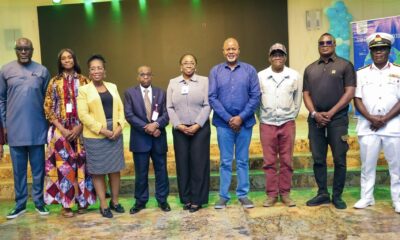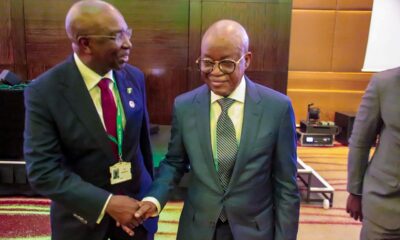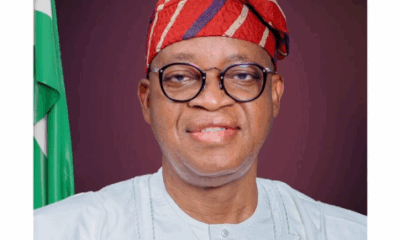Features
SILHOUTTE: Is NLNG Guilty of Tax Obligation Corporate Mood Switch?

BY EGUONO ODJEGBA
Throughout the various stages of human civilization, one feature that remained constant has been the cold relationship between the tax collector and tax payer.
In all climes, there appears to be no love lost between this two categories of citizens yoked together by this civic obligation for the common good. Thus as civilization makes deeper impression on the citizens to respond more appropriately and responsibly to the issues of tax, it has never been a perfectly smooth ride for payers and collectors, even in advanced societies.
Nigeria have had its own fair share of the rat race and enmity arising from such disputes, some of which are unintentional and yet grueling and painful, and yet, sometimes regarded as avoidable.
While it is a universal issue, records show that Nigeria have a disturbing history of non compliant tax culture, producing deviants and non conformists, and often times, identifying some caste of slow or unwilling tax payers; from amongst the wealthiest.
Interestingly, there are also other consequential tax payers with corporate mood swings; as will be made evident, presently.
About a week ago, on November 11, 2024 to be precise, the Nigeria LNG Limited (NLNG) bagged the Federal Inland Revenue Service (FIRS) Most Compliant Taxpayer award. The purported prestigious award which was made at the 2024 FIRS Day during the Lagos International Trade Fair according to reports was designed to acknowledge companies that consistently meet their tax obligations, and thus contributing to the development of the country and its economy.
According to report, the award tagged FIRS Most Supportive Taxpayer Award in 2021, marks a significant achievement for the gas company.
Reacting, NLNG in a statement said, “FIRS commended NLNG for its consistent and exemplary adherence to tax laws, emphasising the Company’s contributions to national development. The service highlighted NLNG’s unwavering commitment to fulfilling its tax responsibilities, recognising the Company’s exceptional compliance with tax regulations and its role in the broader economic growth of the country.”
NLNG’s Managing Director/CEO, Dr. Philip Mshelbila was quoted to have said that the recognition which coincides with NLNG 35th anniversary of its incorporation and the 25th anniversary of successful LNG production in Nigeria, is fulfilling.
“We are honoured to receive this prestigious recognition from the Federal Inland Revenue Service. It reflects the dedication of our Board, management, and staff, who work tirelessly to ensure that NLNG remains a responsible corporate entity. This award also reinforces our ongoing commitment to contributing to the sustainable development of Nigeria’s economy.”
Twelve years ago, the Nigerian Maritime Administration and Safety Agency (NIMASA) in a determined, professionally conducted blockade, sealed off the facilities of the NLNG on alleged basis of non-payment of certain statutory levies by the gas conglomerate.
Part of NIMASA’s mandate as the nation’s apex maritime regulatory organ is the collection of prescribed taxes, revenues and levies. The said operation and standoff which started on Friday June 21, 2013 lasted 22 days.
The blockade effectively denied the gas company access to its Bonny Channel, thus preventing its vessels from either leaving or entering the area. Informing Nigerians of the development, NIMASA in a release signed by the then Acting Director, Shipping Development, Captain Warredi Enisuoh said:
“Today, at about 11.30hrs, the Nigerian Maritime Administration and Safety Agency, using Global West Vessels Specialist platforms blocked off access to the Bonny Channel from the fairway buoy, at the beginning of the Channel, to buoys 17 and 18. By this blockade, all Nigeria Liquefied Natural Gas Company (NLNG) vessels, operating in the area are neither permitted to leave nor enter the area, until all statutory obligations are met.
“This course of action has been forced on the Agency by the NLNG’s disregard and demonstrated unwillingness to abide by the country’s maritime laws especially, sections of the NIMASA Act that mandates payment of levies based on gross freight on exports and imports and the Cabotage Law. Since its inception, the NLNG has cherry-picked our laws. All efforts to get the management to meet its obligations to Nigeria have been treated with impunity.
“While the NLNG is bruited as one of the crown jewels on the nation’s hydrocarbon industry, its habitual violation and the utter contempt for all our laws, is unbecoming of a company of its status.”
But NLNG swiftly condemned the action, describing NIMASA’s action as ill informed and oppressive, noting that the taxes been demanded were unsupported and illegal. Irrespective, one of the quick moves NLNG initiated to resolve the dispute was to call a truce, after an initial legal action against NIMASA appeared to have failed and wasn’t helping the situation.
The development also led to a series of meetings at the instance of the Federal Government which eventually advised NLNG to pay its dues in order to avoid poor image reputation and disruption to its operation. NLNG is owned by four shareholders, namely, the Federal Government of Nigeria, represented by the Nigerian National Petroleum Corporation (49%), Shell Gas BV, SGBV (25.6%), Total LNG Nigeria Limited (15%), and Eni International (10.4%).
NLNG was said to have later made a payment of USD20 million (approximately N3.2 billion) into NIMASA’s account grudgingly, and subsequently approached the court to seek judicial clarity and a lasting resolution to the conflict between the NLNG Act and NIMASA Act.
After a back and forth legal tussle, NLNG was believed to have continued to offset the tax obligation to NIMASA, in the absence of a definitive ruling against the payment, especially in the light of appeal raised by NIMASA against intermediate rulings by the lower court, in favour of NLNG.
Recalled that the giant gas company had filled a case against NIMASA at the Federal High Court Lagos Division, where it sought a judicial determination on the legality of the levies NIMASA sought to impose on it, and the legality of the blockade of the Bonny channel by NIMASA as a result of the dispute.

Subsequently, it accused NIMASA of disobeying a court injunction that ordered it to vacate the blockade on its facilities; amid an initial recourse to amicable resolution for which NIMASA reportedly, pulled out of the area.
In 2017, NLNLG accused NIMASA of being responsible for a loss of $475million. A former NLNG MD/CEO, Babs Omotowa who disclosed that the company lost $475 million during the blockade; further claimed that the court ruled that NIMASA’s demand on NLNG was unlawful.
Omotowa reportedly also said that the court ordered NIMASA to refund all such payments already made by NLNG.
“The blockade was the toughest and lowest period of my five-year tenure at the helm of Nigeria LNG Limited. It was indeed a very lonely and stressful period for Nigeria LNG Limited.”
“The federal high court judgment reinforces NLNG’s position that by the provisions of the applicable laws, the company is not subject to payment to NIMASA of the 3% gross freight as well as the sea protection levy, and that the 2% Cabotage levy is inapplicable because NLNG’s vessels are not involved in coastal trade or Cabotage.”
It is also instructive that NIMASA disputed NLNG’s lamentations as mere gimmick to attract undeserving sympathy. Justifying NIMASA’s actions, Deputy Director/Head, Public Relations, Diokpa Isichei Osamgbi argued that the prevailing course of action was forced on NIMASA by “NLNG’s refusal or/and failure to abide by the outcome of a negotiated settlement arrived at through the mediation process NLNG initiated and subscribed to.
The statement read: “The Nigerian Maritime Administration and Safety Agency (NIMASA), has today in its enforcement of Nigerian laws, served detention notices/orders on vessels belonging to/chartered by the Nigerian Liquefied Natural Gas Company Limited (NLNG).
“This course of action was forced on NIMASA by the NLNG’s subsequent refusal or/and failure to abide by the outcome of the negotiated settlement arrived at through the mediation process it willingly instigated and subscribed to, after reaching agreement with NIMASA on its outstanding debt and paying US$20m out of it and its continued flagrant disregard for Nigerian laws.
“Contrary to NLNG’s position, NIMASA is not aware of any court order against it or any suit brought by NLNG against NIMASA. By its action, the NLNG has trivialized the mediation process and the position of the Federal Government of Nigeria whose Nigerian National Petroleum Corporation owns and holds 49 per cent of the shares in NLNG and which endorsed the agreement reached that NLNG should pay its taxes/levies and observe all its obligations under the laws of Nigeria in which it is operating”.
The Court of Appeal, Lagos Division had on March 29, 2019 set aside the judgment of the Federal High Court, which had exempted NLNG from levies payable to the Federal Government through the NIMASA Act, Cabotage Act, Marine Environment (Sea Protection Levy) Regulations, and other laws of the federation.
The appeal court based its ruling on the fact that NIMASA, the country’s Maritime Regulatory Agency, was not given fair hearing at the lower court. Justice Mohammed Lawal Garba, who delivered the judgement, ordered the return of the case to the Federal High Court for fresh trial under a different judge.
Analysts said believed reversedthe status quo, reaffirms NIMASA’s powers to continue to collect the levies. According to lead counsel of NIMASA, Mr. Lateef Fagbemi (SAN), the effect of the ruling is that the Federal High Court is ordered to revert to the fundamental issue of fair hearing while NLNG continues to pay the statutory levies, pending another ruling by the lower court on the matter.
A closer peep also revealed that NLNG have had previous brushes with the self same FIRS, some of which were resolved through court orders, compelling NLNG to pay its tax indebtedness.
In July this year, the Tax Appeal Tribunal (TAT) sitting in Abuja ordered NLNG to pay FIRS the sum of $27.5 million as full and final settlement of the revised companies income tax for the 2016 assessment year.
Above was part of the judgment of the TAT in the terms of settlement agreed to by parties in an appeal in a case suit filed by NLNG against FIRS over dispute in companies income tax review. The appeal marked: TAT/ABJ/APP/331/2022 was filed on April 21, 2022.
NLNG which had sued the FIRS, prayed the tribunal to restrain the revenue agency from collecting the sum of $141. 75 million from it as CIT for the year under review. The gas company had challenged the FIRS’ notice of additional assessment dated December 15, 2021, and the notice of refusal to amend (NORA) dated March 22, 2022.
Given this background, can it be said that the NLNG Award by FIRS is politically motivated and not a true reflection of compliance credentials driven by genuine corporate motivation?
In Nigeria, awards in the past one decade has become more of a commercial venture; with the least expected segment of society waddling through its murky waters.
Pinnacle Time findings indicate that NLNG thereafter the negotiated settlement regularly fulfilled its obligations to NIMASA, estimated at $11million per month. Nonetheless, it suddenly returned to the court to pursue an appeal shortly after Dr. Dakuku Peterside assumed leadership of NIMASA.
Despite that the said appeal did not produce any substantive ruling, NLNG almost as suddenly discontinued the payment of the said obligations under controversial circumstances.
As NLNG savours its new corporate image in tax compliance behaviour, the development reinforce concerns that institutional and individual leadership dispositions are twin issues that affects tax matters; for good or for bad.
With the NLNG award in tax compliance in view, it remains to be seen what has actually changed in the nation’s tax system that has promoted the new culture of compliance rewarded by FIRS.




































